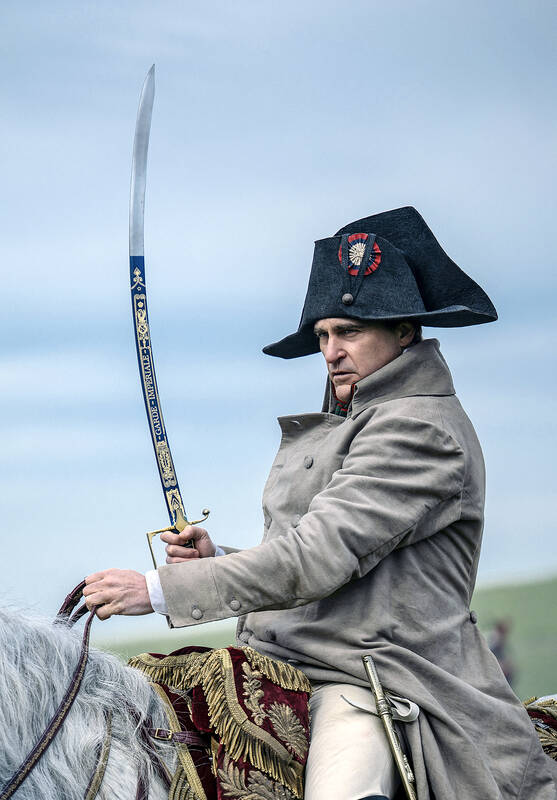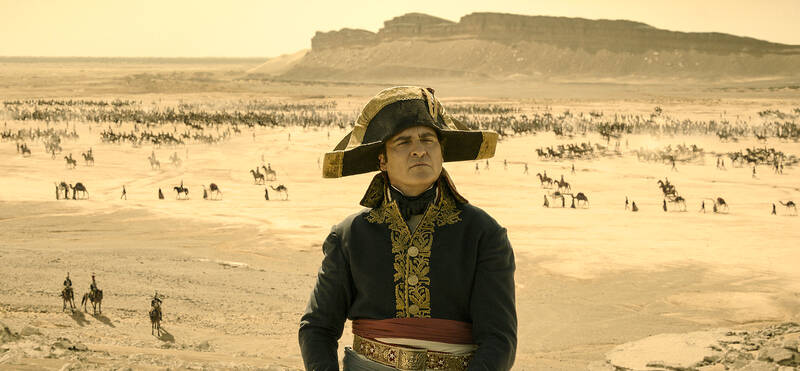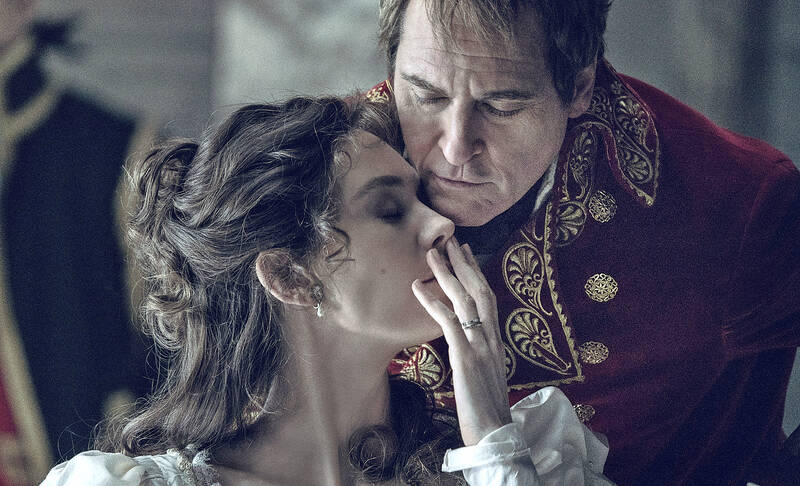“Napoleonic battles are so beautiful. Like vast, lethal ballets… they all have an aesthetic brilliance that doesn’t require a military mind to appreciate.” So said Stanley Kubrick, who had long cherished the ambition of directing a film exploring the life of the Corsican-born artillery officer who rose to become the emperor of France. And Kubrick came close to doing so in the late 1960s, before being forced to abandon the project.
This appreciation of the savage artistry of the great general’s battle strategies is a sentiment that you suspect was shared by Ridley Scott in his approach to Napoleon, a sturdy but uneven historical epic currently in Taiwan theaters that traces the rise and fall of Bonaparte (Joaquin Phoenix), starting with the French Revolution and a not quite historically accurate depiction of the execution of Marie Antoinette, and ending with Napoleon’s death in exile, on the island of Saint Helena. It’s a film that, for all its attempts to show us the man behind the military genius, only fully comes alive on the battlefield.
There’s no question that the combat sequences are impressive. Using numerous cameras, thunderous, enveloping sound and intricate action choreography, Scott manages to convey both the overwhelming tumult of being in the thick of battle and the meticulous efficiency of Napoleon’s strategic planning. It is, not surprisingly, a rather battle-heavy movie, but within this, two sequences in particular stand out.

Photos: AP
The first, a key moment in the young Napoleon’s career, is during the siege of Toulon. British ships (something of a bugbear for Bonaparte throughout his military career, as one unexpectedly funny line reveals) are moored in the harbor. British troops occupy a strategically important fort, from which they amuse themselves by shouting abuse at goats. The catch of Napoleon’s breath is high in the sound mix, making us subliminally aware of the rattled nerves of a young man who has yet to fully prove himself (Napoleon was only 24 at the time, but little attempt is made to de-age Phoenix, who looks solidly middle-aged throughout).
Everything rests on this military operation. Failure, Bonaparte writes in a letter to his brother Lucien (Matthew Needham), will mean that they will be dismissed as “Corsican ruffians unfit for high office.” Fortunately, Napoleon’s nascent brilliance as a commander pays off, with an exhilarating, explosive victory and a promotion, from captain to brigadier general.
Perhaps even more notable is the elegant clarity of Scott’s direction of the decisive victory at the snowbound battle of Austerlitz, regarded by many historians as a tactical masterpiece. In this, and indeed many of the battle scenes, Scott leaches out much of the color (the film veers towards a Napoleonic laundry basket palette of murk and mud throughout), leaving only the throbbing crimson of blood in the icy waters where so many men meet their deaths.

Photos: AP
Like Napoleon himself, the film is rather casual about the sheer scale of loss of life, failing to develop any of the characters of the men in the infantry, the lowly, disposable cannon fodder in Bonaparte’s grand schemes. In fact, the only death that comes close to being mourned by Napoleon is the horse that takes a cannonball to the chest and is blasted from underneath him.
But a man, even a man as combative as Napoleon, amounts to more than the battles he has fought. And it is in this respect that the film is less successful. Unlike Abel Gance’s silent five-and-a-half hour epic Napoleon (1927) — by no small margin still the finest film to tackle the life of Bonaparte — Scott’s picture doesn’t touch on his childhood; Napoleon’s mother’s influence is relegated to a cursory mention and a couple of brief appearances on screen. Phoenix plays up a buffoonish quality in some scenes, a fractious petulance in others, and while this is amusing, it undermines our grasp of other aspects of Bonaparte’s character and gives no clue to the roots of his tenacious pursuit of power.
There are deeper issues with Josephine (the always magnetic Vanessa Kirby), presented here as the key to unlocking Napoleon’s psyche, but who frequently feels jarringly artificial as a character. Josephine is failed by a screenplay (by David Scarp, who also wrote Scott’s next film, Gladiator 2) that views this 18th-century aristocrat through a distorting 21st-century lens. The four-hour director’s cut of Napoleon, which Scott has revealed will stream through Apple TV+ at a later date, may shed a little more light on the man, but is unlikely to iron out the fundamental issues of tone that make Josephine into a dramatic device rather than a woman.

Photo: AP

Most heroes are remembered for the battles they fought. Taiwan’s Black Bat Squadron is remembered for flying into Chinese airspace 838 times between 1953 and 1967, and for the 148 men whose sacrifice bought the intelligence that kept Taiwan secure. Two-thirds of the squadron died carrying out missions most people wouldn’t learn about for another 40 years. The squadron lost 15 aircraft and 148 crew members over those 14 years, making it the deadliest unit in Taiwan’s military history by casualty rate. They flew at night, often at low altitudes, straight into some of the most heavily defended airspace in Asia.

This month the government ordered a one-year block of Xiaohongshu (小紅書) or Rednote, a Chinese social media platform with more than 3 million users in Taiwan. The government pointed to widespread fraud activity on the platform, along with cybersecurity failures. Officials said that they had reached out to the company and asked it to change. However, they received no response. The pro-China parties, the Chinese Nationalist Party (KMT) and Taiwan People’s Party (TPP), immediately swung into action, denouncing the ban as an attack on free speech. This “free speech” claim was then echoed by the People’s Republic of China (PRC),

Many people in Taiwan first learned about universal basic income (UBI) — the idea that the government should provide regular, no-strings-attached payments to each citizen — in 2019. While seeking the Democratic nomination for the 2020 US presidential election, Andrew Yang, a politician of Taiwanese descent, said that, if elected, he’d institute a UBI of US$1,000 per month to “get the economic boot off of people’s throats, allowing them to lift their heads up, breathe, and get excited for the future.” His campaign petered out, but the concept of UBI hasn’t gone away. Throughout the industrialized world, there are fears that

Like much in the world today, theater has experienced major disruptions over the six years since COVID-19. The pandemic, the war in Ukraine and social media have created a new normal of geopolitical and information uncertainty, and the performing arts are not immune to these effects. “Ten years ago people wanted to come to the theater to engage with important issues, but now the Internet allows them to engage with those issues powerfully and immediately,” said Faith Tan, programming director of the Esplanade in Singapore, speaking last week in Japan. “One reaction to unpredictability has been a renewed emphasis on